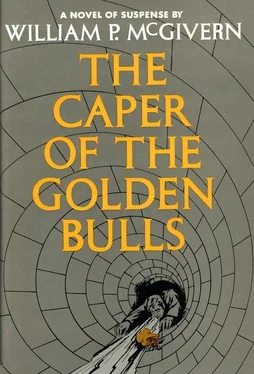William P. McGivern
The Caper of the Golden Bulls
On pleasant mornings Peter Churchman enjoyed swimming in the piscina at the foot of his garden. It was a charming little pool, enclosed by oleanders and a bathhouse crimson with bougainvillaea, but it had been constructed, oddly enough, without a drain; when it was necessary to change the water, Peter’s maids, and some of their friends from nearby villas, kicked off their alpargatas, put on old uniforms, jumped into the pool, and emptied it with buckets.
It was tedious work, but the girls made a holiday of it, splashing about the pool as busily as wrens in a bird bath; and when they were finished they scrubbed the sides and bottom clean with coarse tufts of esparto grass which they twisted from the slopes of the mountain behind the villa.
After all this it took the pool three days to fill. Once upon a time Peter had found this mildly annoying, but that was before his conversion to the philosophical view; after that significant event he had come easily and naturally to the conclusion that a temporarily inoperative swimming pool was a light cross indeed to carry through life.
Most men acquire the philosophical view with a deliberate intellectual effort, or because they have no other choice. Not so with Peter. One morning he had waked with the thought — brilliant and final as a lightning bolt that he had wasted far too much time worrying about things that were never going to happen to him.
All his life all his adult life, at any rate Peter had dreaded only three things: going to prison; losing his hair; losing his keen physical interest in women. Now it seemed fairly obvious that he had escaped and would continue to escape these inhibiting disasters. He had come through that was his phrase for it. He had come through the battle intact.
Of prison, there was no longer any threat at all. And not only had he kept his hair, but it remained black as pitch, except for the silver wings at his temples, and these Peter rather liked. And of the last dread worry, he could snap his fingers at that too, for he was at the moment more ardently and heartily in love than ever before in his life.
With the realisation that he had come through, Peter relaxed, and life became an undiluted joy. He knew that he had not got a big truth by the tail. To understand that one’s fears are groundless may be comforting; but to act on that information was exhilarating. It was a little truth, a little knowledge, but it brought great peace to Peter Churchman.
Rather self-consciously, he began to keep a journal. The first entry read simply: If a man has no goals in life, he can usually find good roads to travel.
Peter was not sure that this was philosophy. But he understood what it meant in relation to himself, and that was what mattered. As the happy peaceful days went by, he began searching for more glitterings of truth. When he found one he brought it back to his journal like a magpie. He never discovered a great diamond of truth, only the ones that were like bits and pieces of coloured glass. But these served their purpose, and in time they provided him many rosy windows from which to look out upon the world. They gave him a picture of things which coincided quite marvellously with his new philosophy.
They enabled him, for instance, to consider with tolerance, if not relish, his astonishing conversation with Grace at dinner the previous night.
At the memory of it Peter dived into the pool without removing his bathrobe.
She had said: “I know you hate surprises. But I must tell you. I have three children.”
Sensibly Peter had put down his fork; otherwise he might have put it in his eye.
“Why in God’s name didn’t you tell me before?”
“While you were making up your mind about me, it didn’t seem fair. To the children, that is.”
“But how about me! Did you think about being fair to me?”
“Oh, Peter. They’re such dears.”
“Now please listen and please try to understand. I don’t like children. It’s not because I’m selfish or insensitive. It’s just a glandular reaction. It’s the same way I feel about sauerkraut or Martinis.”
“That’s very strange.”
“Come on. Lots of people don’t like children.”
“No, I meant about the sauerkraut. Did you ever try it with caraway seeds?”
“Grace! This is serious. Why did you decide to tell me now? On this particular night?”
“Well, my hand was forced, so to speak. My husband wants me to come back to him. That’s why I went to Paris last month.”
“Oh, does he! Tired of his garret and his silly paintings and prostitutes. Now he wants to get back to the fireside, back to all your blue chips.”
She had shaken her finger at him, a tiny gesture of admonition; even in his agitation he had found it endearing.
“No. Guy is very rich. But he has principles. That’s why he wouldn’t give me alimony.”
“He’s a principled tightwad, I’d say.”
“You don’t understand. He feels alimony is demeaning. He doesn’t think a woman should be financially penalised for remarrying. He gave me a million dollars when I left him.”
“Oh. Where are your children?”
“They just arrived this morning. They were in Venice with my mother.”
“I didn’t even know you had a mother.”
“You might have presumed that much.”
“Now please, Grace.” After a long moment he had said: “Darling, let’s not spoil things. Your children, your little dears, do they, well, chatter a lot?”
She had smiled radiantly, “Oh, I do love you, Peter.”
Shaken and dispirited, Peter had gone home to write in his journal: She is tall as a silver beech tree. Bonfires of excitement blaze in her eyes. She is an orchestra of sex. Throbbing drums sounding the charge. Pinwheels of excitement flashing in the tympani. Bugles and trumpets screaming splendid abandonment. Violas (contra-bassoons?) sobbing the final surrender. But she has three children! After a moment of thought, Peter had written: Boarding school? He had underlined this three times, with mounting excitement, and had gone to bed in a fairly cheerful frame of mind.
Peter pulled himself from the pool and removed his dripping bathrobe.
The sun climbed in a white sky. Fresh warm breezes from the sea stirred the flowers and the air became soft and fragrant. You’ve come through, he reminded himself. You didn’t go to prison. You didn’t lose your hair. And you have Grace, from drums to violas. Or contra-bassoons.
He drew a deep breath and squared his shoulders, sustained and enriched by the exhilarating conviction that the worst would never happen; he had come through the battle intact, and the years of peace stretched ahead of him as invitingly as a field of violets on a spring day.
He began his exercises. Once Peter had been rather vain about his physical strength and condition. Now his workouts were brief; stomach exercises, a hundred-odd push-ups, nothing more.
A maid called a name from the terrace, her voice soaring up in the mild air like a flute. The owner of the name came through the opening in the oleander hedge; Antonio Gonzalez y’Najera, the policeman of the village, tidy, stout, cheerful.
He said: “Peter, you’re under arrest.”
Peter collapsed in the middle of a push-up, clutched at his hair.
“I’m sorry, Peter. I’m joking, of course.” Antonio looked at him severely. “But I have a parking summons for you. Yesterday you left your car in front of the burros’ drinking fountain.”
“But just for a few minutes.”
“I’m sorry. It was closer to an hour.” Antonio sat on a bamboo stool, removed his cap, and fanned his face. “You must set a good example for the tourists. You are a permanent resident, a businessman with a bar and restaurant, a man of substance and property.” He sighed.
Читать дальше












